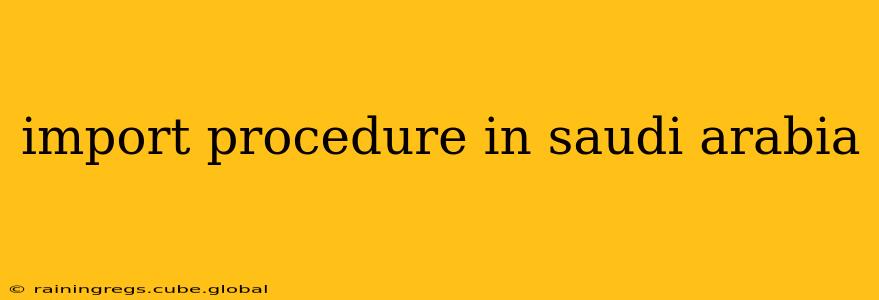Importing goods into Saudi Arabia can seem daunting, but understanding the process is key to a smooth and successful operation. This comprehensive guide breaks down the import procedures, addressing common questions and offering insights for navigating the Saudi Arabian customs system. We'll cover everything from required documentation to potential challenges and solutions.
What are the main steps involved in importing goods into Saudi Arabia?
The import process in Saudi Arabia involves several key stages:
-
Pre-shipment activities: This includes securing necessary licenses and permits, arranging for transportation and insurance, and ensuring your goods meet Saudi Arabian standards and regulations. This often requires working with a customs broker who is familiar with the intricacies of Saudi import regulations.
-
Arrival and customs clearance: Upon arrival at the port of entry (seaport, airport, or land border), your shipment undergoes customs inspection. This involves submitting all required documentation and paying any applicable duties and taxes. The efficiency of this stage depends heavily on the accuracy and completeness of your paperwork.
-
Post-clearance procedures: Once customs clearance is granted, your goods can be released. This may involve additional steps, such as inspections by other government agencies depending on the type of goods.
-
Delivery to the final destination: After clearance, your goods are delivered to your designated warehouse or location within the Kingdom.
What documents are required for importing goods into Saudi Arabia?
The specific documents required will depend on the type of goods being imported. However, some common documents include:
- Commercial Invoice: This detailed invoice outlines the transaction between the buyer and seller.
- Packing List: This document details the contents of each package in the shipment.
- Bill of Lading (B/L) or Air Waybill (AWB): This document serves as proof of transportation.
- Certificate of Origin: This certifies the country of origin of the goods.
- Import License (if required): Certain goods require specific import licenses from relevant Saudi Arabian authorities.
- Other certifications: Depending on the product, you may need additional certifications like health certificates, conformity certificates (e.g., SASO certification), or phytosanitary certificates.
Failure to provide the complete and accurate documentation will significantly delay the import process and may lead to penalties.
What are the common challenges faced when importing goods into Saudi Arabia?
Importers may face several challenges, including:
- Complex regulations: Saudi Arabia's import regulations can be intricate and subject to change. Staying updated on the latest rules is crucial.
- Documentation requirements: The extensive documentation required can be time-consuming and challenging to prepare accurately.
- Customs procedures: Navigating customs procedures can be complex, especially for first-time importers.
- Language barriers: Communication challenges can arise if you don't have someone fluent in Arabic to assist with the process.
How can I find a reliable customs broker in Saudi Arabia?
Engaging a reputable customs broker is highly recommended. They possess the expertise and knowledge to navigate the complex import procedures, ensuring a smoother process. Researching and selecting a broker with a proven track record is vital. Look for brokers with experience handling similar imports and a strong reputation for efficiency and compliance.
What are the import duties and taxes in Saudi Arabia?
Import duties and taxes vary depending on the type of goods. These are generally calculated as a percentage of the goods' value, with additional taxes like VAT (Value Added Tax) also applicable. Consulting the Saudi Customs Authority website for the most up-to-date information on tariffs is essential.
What is SASO certification?
The Saudi Standards, Metrology, and Quality Organization (SASO) is the national standards body in Saudi Arabia. Many products require SASO certification before they can be imported. This certification ensures the product meets Saudi safety and quality standards. Failure to obtain SASO certification will result in the rejection of the shipment.
Are there any free trade agreements that can affect import procedures into Saudi Arabia?
Saudi Arabia is a member of several free trade agreements that can reduce or eliminate import duties on certain goods. Understanding these agreements and their implications can significantly impact your import costs.
This guide provides a general overview; specific requirements may vary. It is crucial to consult with relevant authorities and customs brokers for detailed information tailored to your specific import needs. Always double-check the latest regulations on the official Saudi Arabian government websites before commencing your import operations.
